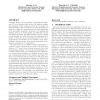Free Online Productivity Tools
i2Speak
i2Symbol
i2OCR
iTex2Img
iWeb2Print
iWeb2Shot
i2Type
iPdf2Split
iPdf2Merge
i2Bopomofo
i2Arabic
i2Style
i2Image
i2PDF
iLatex2Rtf
Sci2ools
125
click to vote
SIGCSE
2009
ACM
2009
ACM
Thinking about computational thinking
Jeannette Wing’s call for teaching Computational Thinking (CT) as a formative skill on par with reading, writing, and arithmetic places computer science in the category of basic knowledge. Just as proficiency in basic language arts helps us to effectively communicate and in basic math helps us to successfully quantitate, proficiency in computational thinking helps us to systematically and efficiently process information and tasks. But while teaching everyone to think computationally is a noble goal, there are pedagogical challenges. Perhaps the most confounding issue is the role of programming, and whether we can separate it from teaching basic computer science. How much programming, if any, should be required for CT proficiency? We believe that to successfully broaden participation in computer science, efforts must be made to lay the foundations of CT long before students experience their first programming language. We posit that programming is to Computer Science what proof ...
Related Content
| Added | 19 May 2010 |
| Updated | 19 May 2010 |
| Type | Conference |
| Year | 2009 |
| Where | SIGCSE |
| Authors | James J. Lu, George H. L. Fletcher |
Comments (0)

